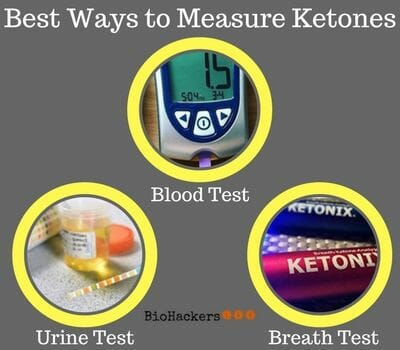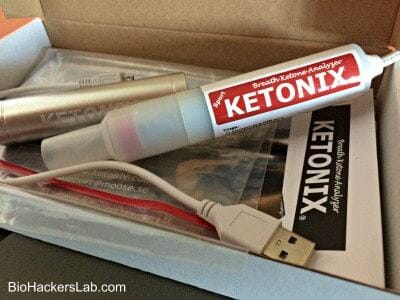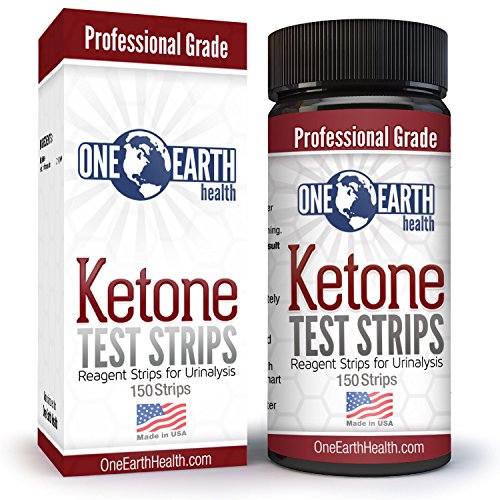
There are three different ways to measure ketone levels easily and accurately to help you determine if you are in a state of ketosis, or not.
The three testing methods are via blood, breath and urine testing strips.
Using any of the three recommended ketone testing methods, you will be able to find your optimal zone of ketosis.
Without an accurate method of ketosis measurement, you will never achieve an optimized low carb high fat diet or ketogenic diet.
Being aware of your what your actual ketone levels are, will help you to be able to manage your weight and regulate blood sugar levels better.
The Three Best Ways to Measure Ketone Levels
In order to find out whether you have reached a level of optimal nutritional ketosis, you have to measure the exact level of different types of ketone bodies present.
Each type of testing kit has positives and negatives, so it is important to make an informed decision.
We will compare blood vs urine vs breath ketone meter analysis.
1. Blood Ketone Tests – Most Accurate Method
The best way to test your ketones is using blood ketone meters to check your levels of β-hydroxybutyrate (BHB).
Blood ketone meter readings are considered to be the gold standard for measuring your level of ketosis. Blood ketone meters are the most accurate method for measuring BHB ketone body levels.
The testing machine and blood test strips needed for this type of measuring method are the most expensive option compared to breath and urine testing.
The cost goes up over time as you will need to purchase the testing strips on a regular basis. If you are doing regular, daily ketosis testing then this will add to the cost.
However, if you are serious about achieving optimal nutritional ketosis, then you cannot beat the accuracy of blood readings.
A good choice to go with is the No products found. that has both ketone and glucose testing strips.
2. Breath Ketone Tests – Best Reusable Method

Breath tests for ketonic compounds are looking to detect and measure acetone, which can be smelled on the breath of those in a nutritional ketosis zone.
This method of measuring ketones is noninvasive and gives fairly accurate readings.
The only downside is it still not as accurate as blood measuring devices.
The best part is it is only a one time fee to buy the device and you can test as many times as you wish with no extra cost.
Check out my Ketonix review on the best ketone breath testing kit available.
I also interviewed Ketonix inventor Michel Lundell on episode 14 of the Biohackers Lab podcast.
3. Urine Ketone Tests – Best Cheap Method

Urine readings for ketone levels are by far the cheapest option available.
You can probably get a month’s supply of measuring strips for a very good price.
Unfortunately, because ketone bodies are predominately carried in the blood, and not urine, it is not as accurate as blood tests.
The urine strips detect excreted compounds from the kidneys to give their results and may not be completely accurate.
A good choice to go with are the One Earth Health urine test strips at Amazon.
If you don’t need exact precision, then you can’t beat the price.
Ketone Testing Terminology
Nutritional Ketosis
Nutritional ketosis is the type of ketosis that occurs from fasting or a ketogenic diet. The beta-hydroxybutyrate ketone level at which you enter nutritonal ketosis is 0.5mmol/L up to 3.0 mmol/L.
Ketone Bodies
Ketone bodies is the name given to the three ketone compounds (acetoacetate, BHB and Acetone) made by your liver from the metabolism of fatty compounds.
Acetoacetate
Acetoacetate is the simplest of the ketone bodies that your body can produce and is measured in the urine. It is acidic in nature and high levels of this compound can lead to imbalanced blood pH levels.
Acetone
Acetone is the result of acetoacetate being broken down. For acetone to be turned back into useful ketone compounds, it must be processed by the liver.
β-Hydroxybutyrate
Beta-Hydroxybutyrate (BHB) is readily made by your liver by breaking down free fatty acids and is measured in the blood.